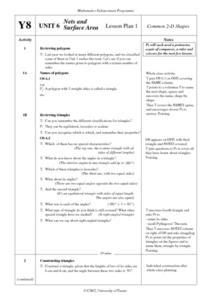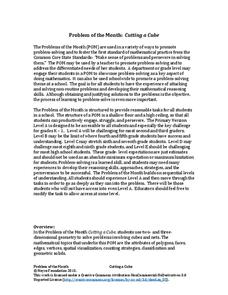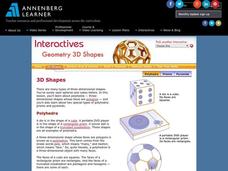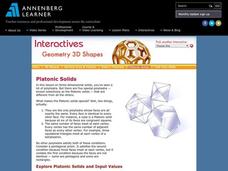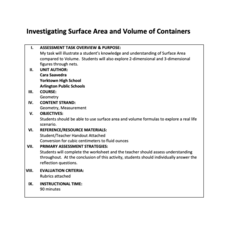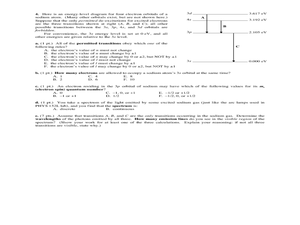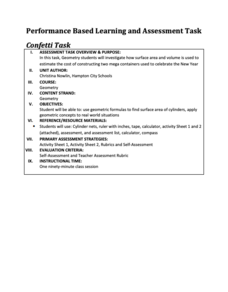Curated OER
The Three R's: Relief, Recovery and Reform through the New Deal Programs
Learners explore how the United States recovered from the Great Depression. In this history lesson, students research a chosen program that was implemented by Franklin D. Roosevelt, then create an informational brochure or pamphlet...
Curated OER
Net (Triangular Pyramid)
In this 3-D folding objects worksheet, students cut out the model to fold and create a triangular pyramid. No instructions are included.
Teacherfiles
Character I.D.
Create ID cards for characters. Provide readers with a template that asks them to affix a photo, identify character traits and list evidence from the text to support this analysis. They indicate changes the character experiences at...
Curated OER
Literature-Based Skill Building: Freak the Mighty Chapter Three
Have your 5th or 6th graders read Freak the Mighty? Check their reading comprehension with this online worksheet. They answer 15 different questions based on chapter 3: American Flyer.
Curated OER
Free Printables: Nets (3D Models)
In this 3D shapes worksheet, students cut out the 3D shape on the page and fold on the lines to create the correct shape. The worksheet states which shape should be build with the cut-out.
Curated OER
Countdown Challenge: Platonic Solids - Part I
Use a Platonic solids worksheet to record the number of faces, edges, and vertices of five polyhedra whose faces, edges, and vertices are all identical. For each figure, learners write a proof of Euler's formula (F+V=E+2). They create a...
Utah Education Network (UEN)
Insides and Outsides
Give small groups handfuls of unit cubes and then dare them to build as many rectangular prisms as possible using only 12 cubes. This engaging activity serves as an introduction to the volume of solid figures. In addition to volume,...
Curated OER
Chapter 14 Review, Section 1: Acids and Bases
An overview of acid and base compounds and their reactions is presented with this handout. Pupils name compounds and write chemical formulas. They write net ionic equations and explain how acidic solutions might conduct electricity. This...
Curated OER
Nets And Surface Area
Upper graders investigate how to find the surface area when using two-dimensional shapes. They conduct an investigation in groups while working sample problems given during class discussion with the teacher. They also review how to...
Curated OER
Edible Geometry
Students examine a chart that lists the main characteristics of polygons and 3 dimensional figures. They make examples of the polygons and figures using pretzels and gum drops showing how the gum drops are vertices and the pretzels are...
Curated OER
How many edges do I need to cut in order to open a cube?
Young scholars problem solve to open a cube to create different shapes. In this problem solving lesson plan, students are given a cube and the shapes to open it up to, and they have to cut the cube open to make certain shapes. This gives...
Curated OER
Net of a figure
In this 3D figure instructional activity, students observe the net of a 3D figure where you open up the figure and tell if it is an accurate representation of that figure. Students complete this for 3 figures.
Noyce Foundation
Cutting a Cube
Teach the ins and outs of the cube! A series of five K–12 level activities explore the make-up of the cube. The beginning lessons focus on the vocabulary related to the cube. Later lessons explore the possible nets that describe a cube....
Annenberg Foundation
Geometry 3D Shapes: 3D Shapes
Explore vocabulary related to three-dimensional shapes. An instructional website describes the characteristics of different geometric solids. Learners can use an interactive component to view nets, faces, vertices, and edges of common...
Annenberg Foundation
Geometry 3D Shapes: Platonic Solids
From polyhedrons to platonic solids, here is a lesson that will have your classes talking! As an introduction to platonic solids, scholars cut and fold nets to create the three-dimensional solids. They use an interactive component to...
Annenberg Foundation
Geometry 3D Shapes: Euler's Theorem
How do you get a theorem named after you? Euler knows what it takes! The third lesson of five asks pupils to use an interactive activity to compare the faces, vertices, and edges of seven different three-dimensional solids. They use...
Curated OER
Sliding Mass Problems
Physics masters solve five sliding mass problems. For each, there are a few different values to be determined: normal force, force of friction, acceleration, velocity, coefficient of friction, or net force. Pupils must draw a force...
Curated OER
Pyramids and Prisms: Guler's Formula
Sixth graders detect and categorize the attributes of geometric shapes to solve problems. In this geometry lesson, 6th graders construct a variety of polyhedra. Students recognize the relationships between two dimensional and three...
Curated OER
Letter D
In this letter d worksheet, students color the animal that starts with the letter D. Students color 1 animal but have 3 animals to choose from.
Curated OER
Poly-Mania
This hands-on activity takes young geometers on a tour of 2D polygons and 3D polyhedrons. After exploring different web resources and discussing geometric shapes, small groups construct models of polyhedrons using bendable straws. Note:...
Radford University
Lemonade Business - Investigating Surface Area and Volume of Containers
Boost lemonade sales by using the perfect container. For a given volume, future entrepreneurs design a container that will have the least surface area and by extension, the least cost of material. They create a two-dimensional net of...
Utah Education Network (UEN)
Geometry
Shape one's understanding of geometry using the resource. The sixth of seven chapters in 6th Grade Math focuses on geometry principles. Future mathematicians learn to find the area of parallelograms, trapezoids, triangles, and other...
Curated OER
Physics 152 Fall 2004 Final Exam, Parts A, B, C, D
At the end of a general physics course focused on light and electricity, you can administer this exam. Concepts covered include electromagnetism, circuits, induction, light rays, lenses and mirrors, characteristics of light, electron...
Radford University
Confetti Task
Using the net of a can, learners develop formulas for the surface area and volume of a cylinder. They then apply their formulas to solve problems about a cylindrical container used to disperse confetti.








